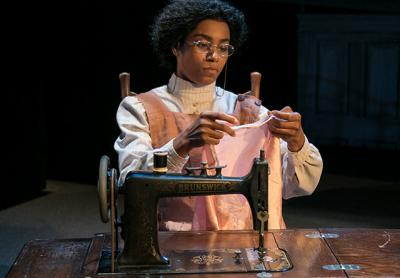Stumbling Into Matrimony in Sag Harbor

Race and matrimony are at the heart of “Intimate Apparel,” a 2003 play by Lynn Nottage in revival now through July 30 at Bay Street Theater in Sag Harbor.
This affecting, if sometimes sluggish, play introduces Esther, an African-American woman who travels to 1905 New York in an attempt to live and work independently. She lives in a boarding house for women while working as a seamstress, sewing (you guessed it) intimate apparel for her clients, who range from wealthy white women to prostitutes.
As the play begins, Esther is 35 and still single, though she has a pen pal named George Armstrong who is working on the Panama Canal and eager for female companionship. Their letters to each other (each written by a third party, it will turn out) grow increasingly amorous. Might George come to New York and marry her, Esther begins to wonder?
Be careful what you wish for, my dear.
While the real subject of “Intimate Apparel” is the difficulty for African-American women in forging lives of their own in post-antebellum America, Ms. Nottage seems to take special aim at the institution of marriage, which never fares well in this drama. One of Esther’s clients, for example, a Mrs. Van Buren, is a frivolous white socialite whose husband is having numerous affairs, and she revels in her independence when her husband attends to business abroad, leaving her alone for months. Another of Esther’s friends, Mayme, meanwhile, is a black prostitute whose clients are “all married,” prompting Mayme to take a dim view of relationships.
By the time George Armstrong arrives in New York to marry Esther, you are ready for the worst, and indeed the first act ends with the newly betrothed couple holding hands and staring out into the audience with a distinct look of terror.
Suffice it to say that the Armstrong marriage quickly runs into problems. The Caribbean-born George finds his own racial stumbling blocks in his search for work and begins to dig into Esther’s life savings, which she has sewn into her quilt. Esther, on the other hand, has a continuing flirtation with a Jewish fabric merchant, a man who would be a more suitable husband than George if not for the racial and religious prohibitions.
If you think this doesn’t exactly sound like the stuff of dramatic fireworks, you would be correct. “Intimate Apparel” is a subtle drama played out in a minor key, though if this production lacks a certain energy at times, it hardly seems like the fault of the cast, who breathe badly needed oxygen into the somewhat airless script.
Kelly McCreary as Esther especially brings great depth and empathy to an otherwise dour character. Her impassive acceptance of heartbreak seems to speak directly to the African-American experience of the era — as if disappointment is not only expected but inevitable. Then there is Julia Motyka as Mrs. Van Buren, who plays up her character’s frivolity with wicked glee, employing bourbon and a high-pitched superficiality to hide her pain. And Edward O’Blenis is so likable as George (even if his Caribbean accent isn’t always convincing), the audience sympathizes with him probably more than it should, even when his behavior turns cruel.
Ms. Nottage is the first woman to win a Pulitzer Prize for drama twice, first for “Ruined” in 2009 and then again this year for “Sweat.” With “Intimate Apparel,” however, you never really feel the liftoff of great drama, and at nearly 2 hours and 40 minutes’ running time, the play begins to feel overlong and undercooked. It’s as if the work were born of a social history lesson, rather than artistic inspiration.
In spite of this, you will be moved by the end of “Intimate Apparel,” the emotions of which seem to creep up from behind rather than knock you cold. Ms. McCreary’s performance is daring in its use of sadness and melancholy to slowly win over an audience, and the actress earned a standing ovation on the night I attended.
Along the way, however, theatergoers will need to bring a healthy dose of patience to this somber, dilatory drama.
